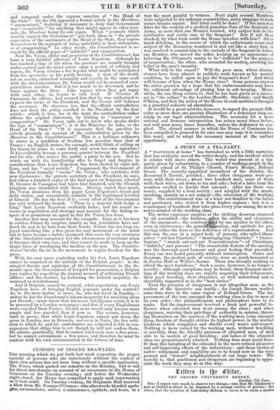CUSTODY OF INSANE BRAWLF.Rg.
THE warning which we put forth last week respecting the proper custody of persons who are notoriously without the control of their own actions has not been long without a specific application. The Times, which quoted our remarks on the Monday, had to call for direct interference on account of an occurrence in the House of Commons on the Tuesday evening ; and before the Wednesday night closed, the House was compelled to apply such intervention as it beat could. On Tuesday evening, Sir Benjamin Hall received a blow from Mr. Feargus nnor ; who afterwards blended apolo- gies, extenuations, smiles, reminiscences, epithets, and tears, in a
way the most painful to witness. Next night several Members were subjected to his unhappy eccentricities, and a stoppage to such scenes became urgent. But what could be done ? If the man was fitter for the custody of a medical guardian than of the Sergeant at Arms, as more than one Member insisted, why subject him to the retributive and costly care of the Sergeant? But if not thus checked, by what form could the House interfere with him ? Aker much debating, in the course of which the unfortunate cause and subject of the discussion wandered in and out like a stray hen, it was resolved to commit him to the custody of the Sergeant at Arms; one Member, who moved the order, keeping up an appearance of believing Mr. O'Connor's sanity to be "sufficient" for the purpose of incarceration; the other, who seconded the motion, avowing his belief in the man's insanity.
What will be the sequel ? Will the poor man, whose circum- stances have been almost as publicly made known as his mental condition, be called upon to pay the Sergeant's fees? And what will become of him when the House rises ? Some persons answer the latter question by a hope that his embarrassments may have the collateral advantage of placing him in safe keeping. Mean- while, the one thing certain is, that he has been given as a succes- sor in "the cellars" to the London Sheriffs, Stoekdale, and Smith O'Brien, and that the action of the House in such matters is brought to a practical reductio ad absurdum.
It would be a great mistake, however, to regard the present diffi- culty as more than one passing illustration of a deficiency long ex- isting in our legal administration. The necessity for a more rational and humane interposition has arisen many times before, and will arise many times hereafter, unless the deficiency be sup- plied. The absurd manner in which the House of Commons has been compelled to proceed in its own ease may urge it to remember this want, and to adopt the necessary measure at the earliest opportunity.


























 Previous page
Previous page